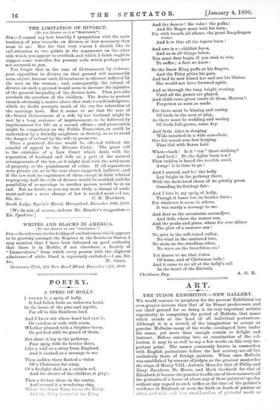THE LIMITATION OF DIVORCE.
[To vox EDITOR OF TEE " SPECTATOR.".1 Cannot say how heartily I sympathise with the main tendency of your remarks on divorce, or how necessary they seem to me. But for that very reason I should like to call attention to two points in the arguments on the other side which you appear to overlook, and which I think ought to suggest some remedies for present evils which perhaps have not occurred to you.
You forget that in the case of ill-treatment by violence, your opposition to divorce on that ground will necessarily seem unjust, because such ill-treatment is oftenest inflicted by the man on the woman ; and, consequently, the refusal of divorce on such a ground would seem to increase the injustice of the present inequality of the divorce laws. Then you also overlook the question of the children. The desire to protect them is obviously a motive above that wish for self-indulgence, which no doubt prompts much of the cry for relaxation of the marriage laws. But it seems to me that the case of the brutal ill-treatment of a wife by her husband might be met by a long sentence of imprisonment, to be followed by imprisonment for life on a second offence ; and prosecution might be compulsory on the Public Prosecutor, or could be undertaken by a friendly neighbour or Society, so as to avoid the danger of refusal by the wife to prosecute.
Thus a practical divorce would be effected without the scandal of appeal to the Divorce Court. The great evil is the existence of a Law Court which deals with the separation of husband and wife as a part of the natural arrangements of the law, as it might deal with the settlement of property, or the punishment of crime. If all separations were private (or, as in the case above suggested, indirect), and if the law took no cognisance of them except in their relation to property, half the evils of divorce would be avoided, and the possibility of re-marriage to another person would be at an end. But no doubt, as you say most truly, a change of senti- ment and not a mere change of law is needed most. —I am,
[We do not, of course, endorse Mr. Maurice's suggestion.— ED. Spectator.]














































 Previous page
Previous page